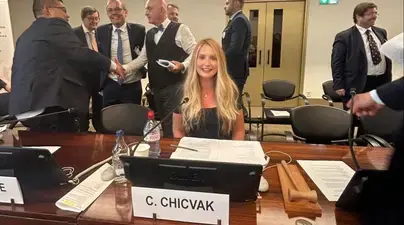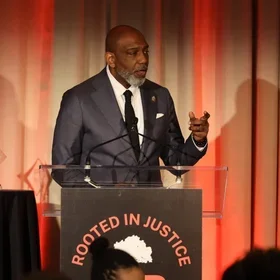This past June, Courtney Chicvak, capstone lecturer in the Negotiation and Conflict Resolution program, joined other attorneys, legal-industry experts, technologists, and United Nations officials representing more than 30 countries at the historic Palais des Nations in Geneva, Switzerland.
The event, United Nations Sustainable Development Goals, Artificial Intelligence, and the Future of Legal Professions: Fostering Equality and Access to Law, was co-sponsored by the Swiss-Chinese Lawyers Association and the Centre for Research and Initiatives for Dialogue. The goals: to discuss the role of artificial intelligence in legal practice, find common ground regarding the ethical and sustainable adoption of artificial intelligence, and create a declaration for attorney adoption of artificial intelligence in alignment with the United Nations Sustainable Development Goals (SDGs) framework.

Chicvak, attorney, CEO, and conflict resolution specialist at Courtney Anne Chicvak Mediation LLC sat on the panel “AI as a Double-Edged Sword: Risks to the SDGs Posed by the Use of AI in the Legal Profession.” The group identified several challenges that AI presents in meeting the UN’s SDGs 5 (Gender Equality and Women’s Empowerment), 16 (Peace, Justice, and Strong Institutions), and 17 (Partnerships for the Goals).
The panel weighed concerns about equality, bias, and access to justice. They also discussed privacy and security related to artificial intelligence in the legal field, including alternative dispute resolution processes such as negotiation, mediation, and arbitration.
As a result of the dialogue during the conference, attorney representatives from all countries reached an agreement on the terms of the first-ever global Universal Declaration of the Use of AI in the Legal Profession.
About the Program
Columbia University’s Master of Science in Negotiation and Conflict Resolution prepares students to analyze the root causes and dynamics of conflict and to transform disputes through reasoned and resourceful interventions. The program focuses on developing self-awareness, tenacity, and interpersonal competency; building common ground; opening lines of communication; ensuring representation and recognition, and building sustainable possibilities for resolution.


